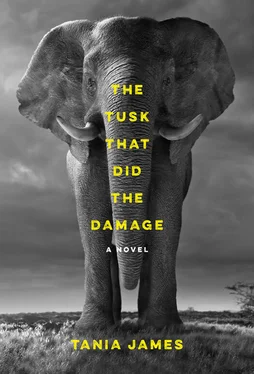SAMINA HAKIM: I am Samina Hakim, Divisional Range Officer for Kavanar region. We work closely with the Wildlife Rescue and Rehabilitation Center, which was established in partnership with the Kerala Forest Department.
Just like that, her personality turned automated as she summarized her father’s work as a ranger, her own brief stint as a software engineer in Techno Park, and her quick ascent to becoming the first female range officer in India, at which point she sat back, as if she’d finished her meal and were waiting for the check.
I was caught off guard by her sudden brusqueness and, in fumbling for something to say, happened on a cliché—
EMMA: Your father must be proud.
— which caught Samina off guard. There was a long pause.
SAMINA: My father is not alive. He was killed in a gunfight with poachers in 1992.
EMMA: Oh, I’m so sorry … Was that the year you applied?
SAMINA: Yes. ( Pause. ) This is a film about the Rescue Center, no?
EMMA: It is, but we’re also interested in the people who come in contact with the center. Of course you’re not obligated to discuss anything you don’t want to. I just find your background compelling, especially as a woman stepping into unfamiliar territory.
SAMINA HAKIM: The territory suits me very well.
EMMA: Yeah, it looks like poaching has gone way down under your tenure. How’ve you made that happen?
SAMINA HAKIM: We have increased the number of cases registered, and we have established protection strategies and antipoaching camps.
EMMA: I’ve heard people say you’re a lot more effective than your predecessor — Mr. P. K. Kurian?
SAMINA HAKIM: I will not comment on that. Simply I have made wildlife and conservation my topmost priority.
EMMA: Did Mr. Kurian have a different priority?
SAMINA HAKIM: No, no, I will not say that. I prefer to focus on positive things, such as, for example, we have been making great strides in protecting forest areas from habitat destruction. We are involving local communities by training them in sustainable extraction methods of nontimber forest products including honey and cardamom, and, as such, we are making the protection of the forest a priority for all people.
EMMA: I see.
SAMINA HAKIM: Any more questions? I have limited time today.
EMMA: Of course, sure …
(Extended pause.)
Just switching gears for a second … I was reading about a particular case involving the Shankar Timber Company.
SAMINA HAKIM: …
EMMA: It was about a protest by a number of villagers who were upset that the Forest Department had allowed a timber company to cut down all the trees on what they perceived—
SAMINA HAKIM: Where did you read this?
EMMA: I don’t remember where actually.
SAMINA HAKIM: You know what? These villagers are upset because they see the profit from cutting timber. They want license to do so as well. The Forest Department cannot allow unregulated removal of timber and degradation of the forest. We only give clearance after careful consideration as to whether the outcome is in the public interest.
EMMA: Were the villagers consulted? Or even warned?
SAMINA HAKIM: No.
EMMA: Isn’t that a violation of your conservationist principles, like the involvement of local communities—
SAMINA HAKIM: I have answered enough. I think we are finished.
EMMA: There’s nothing more you’d like to add?
SAMINA HAKIM: Off it. Off the camera, please.
As we left the office, Teddy peppered me with questions, all to do with where I’d gotten my intel on Shankar Timber. I told him I’d explain later, when Ravi wasn’t waiting by the car.
I hadn’t planned to bring up the Shankar Timber case, but as the interview went on, and her answers took on the practiced cadence of a recitation ( as such … such as … as such ), I’d realized there was no other way of cracking her Teflon veneer. No way but one. The scandal was fair game; it had been in the news, after all. I hadn’t jumped her while she was at home in a bathrobe. She had to know the topic might come up.
And yet, judging by her response — the way her hands fused into a gridiron clasp — it was clear she hadn’t foreseen this turn at all.
Nor had I considered how my questions might affect Ravi, and his opinion of me. It only made sense to keep him in the dark, for the time being.
An hour later, Ravi, Teddy, and I were strolling through Kavanar Wildlife Park behind Officer Soman and Officer Vasu. Teddy took sound, and I filmed as we filed through the green, all of it undulating just beyond our reach. I’d missed the cool of being behind the camera, hyperattuned to our surroundings and yet detached. There was so much to capture: frothy white bursts of Communist green, so named, Ravi explained, because of its tendency to spread. Macaques rattling the highest branches of the teaks. Nests of silky white orchids sprouting from the branches of trees with roots like lava spills gone solid; red ants threading through a spewage of buffalo dung.
And then there was Officer Vasu and Officer Soman, both of whom had the quaint, bulbous features of garden gnomes. I paid more attention to Officer Vasu, only because he seemed the friendlier of the two. Through Ravi, I asked him about the giant rifle that hung from his shoulder, how often he’d had to use it against poachers. Officer Vasu received each question with a bashful smile and a lift of his nearly hairless eyebrows. “Once or twice,” he said. “But not directly at a poacher.”
“Why not?”
“If we kill someone, the media gets involved, then the Human Rights Commission. We can lose our jobs. There are many barriers for us.”
Without elaborating on the barriers, Officer Vasu walked on. I noted the laces of his shoes were tied haphazardly, woven through random holes and wrapped threefold around the ankles so they wouldn’t slip off. What did a poacher have to fear from a guy with oversized camo shoes and putty lumps for brows?
Farther along, Officer Soman pointed out the leaning wreckage of bamboo, thick as elephant bones, thirty years old and weeks away from decay. “Elephants love the bamboo,” Ravi added, “so the shortage is drawing them to the farms. And the Forest Department isn’t replanting, so—”
What followed was a volley of heated voices, passing so rapid fire we could only film and ask for translation later:
SOMAN: Everyone blames the Forest Department.
RAVI: I’m not blaming—
SOMAN: You know well as I do any decision like that must come from Trivandrum.
RAVI: I just say how I see it. The farmers say the same thing about the bamboo.
SOMAN: Hah! Bunch of IIT geniuses, those people! They also say we should build a Great Wall of China around the park. What is this — a zoo?
VASU: Calm yourself, Soman. They’re filming.
SOMAN: They don’t care what we say. We won’t be in their film.
VASU: Why not?
SOMAN: People like them don’t make movies about people like us.
VASU: How would you know? You don’t even watch movies.
SOMAN: I know that piece of grass in your mouth doesn’t make you Sunil Shetty.
VASU: People can cry and fight all they want, but there will come a time when the bamboo will disappear, then the elephants, then us, and all will be as it was before we arrived. Or maybe it will be something different.
SOMAN: So?
VASU: The world is changing. If it was not changing, it would not be the world.
(Silence.)
SOMAN: Someone give this man a Filmfare Award.
After the hike, our hosts took us to rest at their quarters, a two-level bamboo dwelling on stilts. An officer was perched in the lookout tower. We passed by a small garden, displaying neat rows of beans, curry leaves, and cabbages, staked in the center with a strung-up can of Shakti mustard oil, bouncing sunlight as it swung.
Читать дальше












